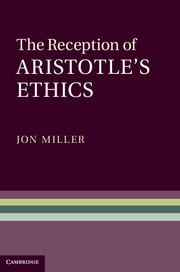Book contents
- The Reception of Aristotle's Ethics
- Contents
- Notes on contributors
- Acknowledgments
- A note on abbreviations and transliteration
- Introduction
- Chapter 1 The Nicomachean Ethics in Hellenistic philosophy
- Chapter 2 The transformation of Aristotle's ethics in Roman philosophy
- Chapter 3 Aristotelian ethics in Plotinus
- Chapter 4 St. Augustine's appropriation and transformation of Aristotelian eudaimonia
- Chapter 5 The Arabic and Islamic reception of the Nicomachean Ethics
- Chapter 6 Maimonides’ appropriation of Aristotle's ethics
- Chapter 7 The relation of prudence and synderesis to happiness in the medieval commentaries on Aristotle's ethics
- Chapter 8 Using Seneca to read Aristotle
- Chapter 9 Aristotle's Ethics in the Renaissance
- Chapter 10 The end of ends? Aristotelian themes in early modern ethics
- Chapter 11 Affective conflict and virtue
- Chapter 12 Kant and Aristotle on ethics
- Chapter 13 The fall and rise of Aristotelian ethics in Anglo-American moral philosophy
- Bibliography
- Index
Chapter 10 - The end of ends? Aristotelian themes in early modern ethics
Published online by Cambridge University Press: 05 February 2013
- The Reception of Aristotle's Ethics
- Contents
- Notes on contributors
- Acknowledgments
- A note on abbreviations and transliteration
- Introduction
- Chapter 1 The Nicomachean Ethics in Hellenistic philosophy
- Chapter 2 The transformation of Aristotle's ethics in Roman philosophy
- Chapter 3 Aristotelian ethics in Plotinus
- Chapter 4 St. Augustine's appropriation and transformation of Aristotelian eudaimonia
- Chapter 5 The Arabic and Islamic reception of the Nicomachean Ethics
- Chapter 6 Maimonides’ appropriation of Aristotle's ethics
- Chapter 7 The relation of prudence and synderesis to happiness in the medieval commentaries on Aristotle's ethics
- Chapter 8 Using Seneca to read Aristotle
- Chapter 9 Aristotle's Ethics in the Renaissance
- Chapter 10 The end of ends? Aristotelian themes in early modern ethics
- Chapter 11 Affective conflict and virtue
- Chapter 12 Kant and Aristotle on ethics
- Chapter 13 The fall and rise of Aristotelian ethics in Anglo-American moral philosophy
- Bibliography
- Index
Summary
That Aristotle's Nicomachean Ethics casts a long shadow over the history of philosophy goes without saying. That its influence continues to be felt among philosophers in the seventeenth century, particularly those recognized as quintessentially modern thinkers, is a more contentious proposition whose affirmation requires considerable qualification and argument. Textbook accounts of early modern philosophy emphasize its sharp break, especially in natural philosophy and metaphysics, with the doctrines of Aristotle. In part, this is a result of taking at face value the rhetoric of early modern figures who stress their independence and distance from Aristotle. More often than not, however, what these figures are eager to reject is not so much the content of Aristotle's own texts, as the accretions of commentary on Aristotelian doctrines that comprise the body of scholastic philosophy, along with the methods of commentary and disputation on which that tradition relies. The imperative of the moderns is to address head-on the problems that nature has set for us, not X's criticisms of Y's interpretation of Aristotle's answer to a given problem. There are, to be sure, places at which characteristically modern accounts of matter, mind and causation directly challenge the content of Aristotle's theories. Yet even here there has been a growing recognition of the danger of reading seventeenth-century philosophers as monolithic in their rejection of central Aristotelian doctrines, such as teleology and hylomorphism.
The early moderns’ relation to Aristotle's practical philosophy, and especially his ethics, has received much less attention in the literature, and consequently suffers less from the weight of received opinion. In part, this reflects the fact that until recently relatively little attention had been devoted to the practical side of early modern philosophy, as against topics in epistemology and metaphysics, and to a lesser degree natural philosophy. In the domains of ethics and political philosophy, there are obvious places at which seventeenth-century philosophers stress their disagreement with Aristotle: Gassendi's qualified defense of Epicureanism; Hobbes's arguments for the artificiality of justice and the state; the movement in Grotius, Pufendorf, Cumberland and Locke toward a conception of morality founded on law rather than virtue. In these ways and others, we find the development of alternative conceptions of moral philosophy in the early modern period, which stand opposed to the teachings of the Nicomachean Ethics and are consequential for the subsequent development of the discipline.
- Type
- Chapter
- Information
- The Reception of Aristotle's Ethics , pp. 194 - 221Publisher: Cambridge University PressPrint publication year: 2012
- 1
- Cited by



